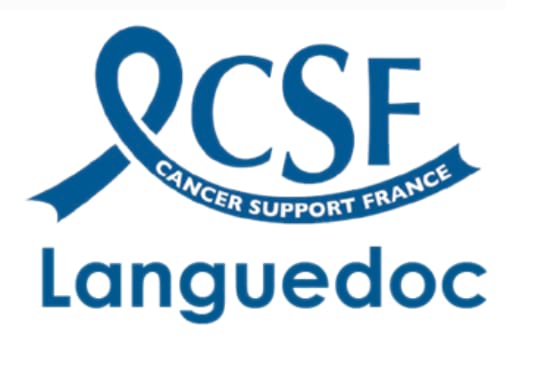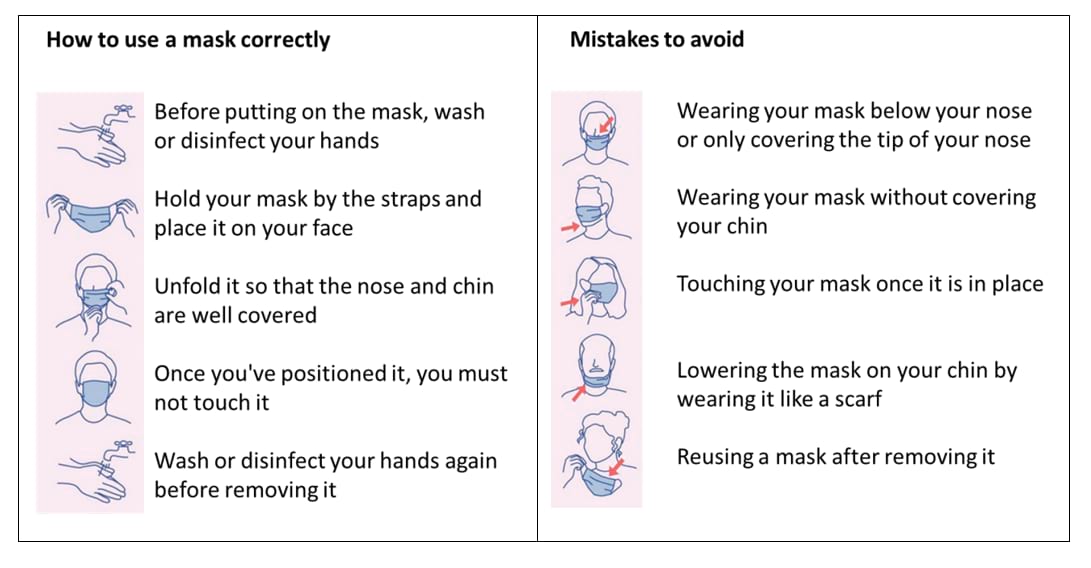To help keep English-speaking residents and visitors to the region informed, CSF Languedoc have been sharing bulletins of extremely useful information.Taken from verified government sources, this is a fountain of knowledge during these uncertain times – big thank you to CSF Languedoc!
Read their previous bulletin here and here. You can also read our breakdown of Macron’s latest announcements here.

Welcome to our twentieth bulletin during the Coronavirus epidemic. In this issue we have information about:
- Concern about increased pace of clusters and confirmed cases of Covid-19 in France
- Towns and villages in Occitanie that have now made it a requirement to wear masks in certain public outdoor spaces (e.g. markets, main thoroughfares etc)
- Free masks (10 per week) on prescription for people with serious, long-term health conditions (affection longue durée)
Concern about increased pace of clusters and confirmed cases of Covid-19 in France
Whilst numbers of serious cases (involving hospitalisation) in France continue to reduce, the Covid-19 virus is still in circulation, with the number of clusters on mainland France steadily continuing and rising. (A cluster is where three confirmed or probable cases are identified in a period of seven days, related to one community or gathering.)
The concern for Santé Publique France (Public Health France) is that an upwards trend in the number of new clusters since the beginning of July has been confirmed. This means it is now in excess of when confinement was lifted.
In all, since mid-May, 531 clusters have been identified. Among them, 308 are “closed” (no more new cases for 14 days) and 59 “under control” (no more new cases for 7 days). 147 are being investigated and 17 have spread within communities, without the authorities managing to fully control them. All of these categories have increased in number since 8 July, including an increase of clusters not fully controlled and the number of clusters under investigation.
There are some wider-spread clusters in Quiberon, Pornichet and Annecy receiving a lot of publicity.
From 31 July, the Health Authority identified an increased number of cases among 18 to 30 year-olds who have gathered for parties (not related to known clusters) in Haute Garonne and more specifically Toulouse, which has now put that department in the moderate risk category. Hérault remains low risk, although there is a slight increase of daily diagnosed cases peaking at 21 cases on 28 July. The percentage of positive tests in Occitanie has also increased to 1.1% in the last week. There were 40,000 tests last week with an average of 57 cases per day.
Sources of clusters are being identified (in descending order of magnitude*) as:
- Public and private companies
- Other communities (falling outside the other categories used)
- Public and private establishments/institutions
- Extended family environments/gatherings
- Health establishments (medical centres, hospitals etc)
- Social housing, hostels and supported housing environments
- Schools and Universities
- Nurseries
- Vulnerable communities
- Services for people with disabilities
- Small geographical areas
- Transport (planes, boats, trains)
- Child welfare services
- Prisons and penitentiaries
*Care Homes are excluded from the figures that have been used for this list, however numbers of cases in care homes since 8 July remain low.
Younger people (20-40) are the main group affected by the increase in numbers of Covid-19 cases. The worry is that with mild or no symptoms, and with many in this group therefore not getting tested, the risk to others is increasing.
Please keep using the recommended preventative measures, and please stay safe.
Towns and villages in Occitanie requiring the wearing of masks in certain public outdoor spaces (e.g. markets, main thoroughfares etc)
From 31 July, Olivier Véran confirmed that préfets had the right to make it mandatory to wear masks in public outdoor spaces in order to better manage the risk of Covid-19 spreading at a local level.
In Occitanie, the following towns have declared that wearing a mask in certain outdoor public spaces is a requirement (the detail of where can vary between locations):
Bagnols sur Cèze
Beziers
Frontignan
Grau du Roi
Leucate
Nimes
Pont St. Esprit
Sete
Please do look out for further information regarding anywhere you are likely to visit to be sure you are not breaking local bye-laws.
Please be aware that this list is likely to change and grow over time.
Free masks (10 per week) on prescription for people with serious, long-term health conditions (affection longue durée)
Anyone with a condition identified as ALD (including cancer, many heart conditions, etc) has the right to 10 masks a week on prescription, free. This is due to continue until 31 August and may be revised to continue beyond that.
We recommend that anyone with an ALD makes sure they are talking with their GP and receiving due care, including masks to suit their needs.
Cancer Support France-Languedoc (CSF-L), Covid-19 response
CSF-L continues to support Anglophones touched by cancer in the Herault and Aveyron, as well as extending support to people touched by Covid-19 during the crisis. In line with guidance, this is done at distance. Our Helpline can be reached on 04 67 44 87 06. (This is a voicemail service and we aim to return calls within 24 hours of a message being left).
If there is information you would like to share with others, please contact us using our email address: feedback.csflanguedoc@gmail.com
We hope you stay safe and well.
CSF-Languedoc

Before handling the mask, wash your hands with soap and water or disinfect them with a hydro-alcoholic gel.
If you have early Covid-19 signs, which are:
- cough
- fever
… stay at home and self-isolate. Phone your GP to discuss your symptoms/how you are feeling. (Do not go to visit your doctor with symptoms). If it is out-of-hours, you can call an out-of-hours service, either as directed by your GP, or using SOS Médecins, Tel: 3624 (note, this costs your standard call rate + 15c p minute).
- If you are unsure of the seriousness of your symptoms, check with your doctor.
- If you develop difficulty breathing, phone the emergency health response/ambulance service on 15 or 114 (for anyone with hearing difficulties).
Where a GP thinks a test is appropriate, they will provide a prescription and further information. Also, it is possible to pay for a test and have it without a prescription.
Brexit preparations / applications for residency permit (Carte/Titre de Sejour)
From 1 July 2021, anyone British, who does not also have European nationality, and whose main residence is in France (please note restrictions on stay for non-permanent residents – no more than 90 in 180 days), will be obliged to have a residency permit (Carte/Titre de Sejour).
The French government had planned to have an online application process for this purpose available from July 2020, however this is now delayed until October 2020, providing a shorter time period for applications to be made.
Government information in English about the rights of British people living in France can be found on the following websites:
https://brexit.gouv.fr/sites/brexit/accueil/vous-etes-britannique-en/droit-au-sejour-en.html
https://www.gov.uk/guidance/living-in-france
https://www.gov.uk/world/france
Citizens’ rights groups are also sharing information about Brexit and its consequences, including the need to apply for a residency permit and guidance on how to do so (when available).
Two recommended groups can be found on the following links:
https://www.remaininfrance.fr/
https://www.francerights.org/your-rights.html
Guidance about the application system is not yet available and this is something we will aim to provide information about in the future.
StopCovid app
The French StopCovid app has been devised to allow tracing where people using the app come into contact, and one or other person is identified as having Covid-19 within a two-week period of that contact.
The app was delayed until agreed by the Commission nationale de l’informatique et des libertés (CNIL) [the National Commission for Data Protection].
The CNIL was particularly pleased that some of its recommendations were followed on the anonymisation of contacts, the duration of data backup (14 days), the fact that it is the Ministry of Health who is responsible for information from the app, and that there is freedom of choice about whether or not to install StopCovid on your smartphone, without any negative legal consequence (on access to public transport for example).
The Privacy Note confirms:
- It doesn’t track location, only stores details of phones running the app that the user has been near to for15 minutes or more.
- If someone with the app tests positive for Covid-19, they will get a code to enter and that will activate an alert to the devices registered as being nearby for 15 minutes or more over the last 14 days. It is then up to the recipients of the alert to take action. All of this is done anonymously.
The app can be used on both iPhones (App Store) and Android phones (Google Play).
CSF-Languedoc members have tested it on both Android and iPhones with French and UK mobiles. The app is easy to install and provides an interface in English if this is the language you use on the phone.
It uses Bluetooth technology and there have been some reports that it can use a lot of battery, though this varies. Some people choose to deactivate it when at home and reactivate it on leaving home. The issue here is that if someone forgets to reactivate it, it will not offer the service for which it is designed.
Scams and fraud
Scammers and fraudsters continue to take advantage of the changes brought by Covid-19. Recently there have been a spate of Scam phone calls in the name of Orange.
The golden rules to stay safe are:
- do not respond / reply to any emails, texts or phone calls that are unusual
- never give out your personal details or PINs, passwords etc.
